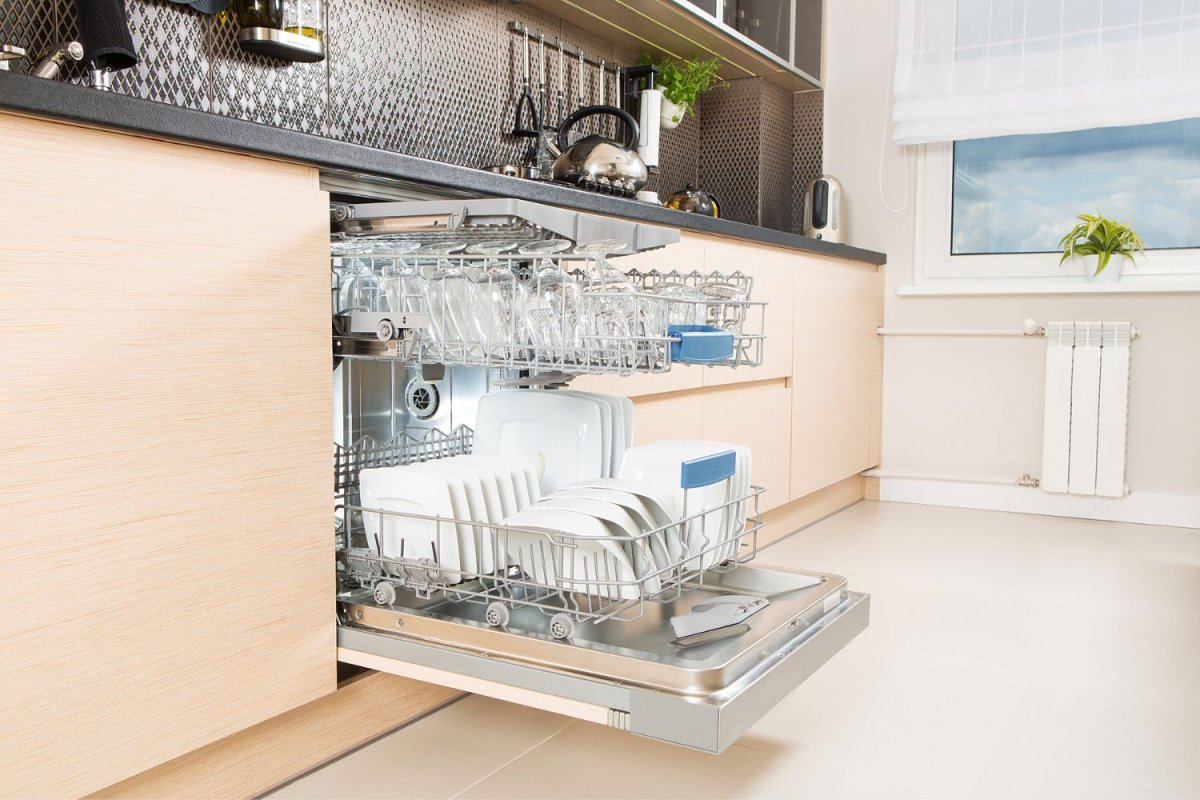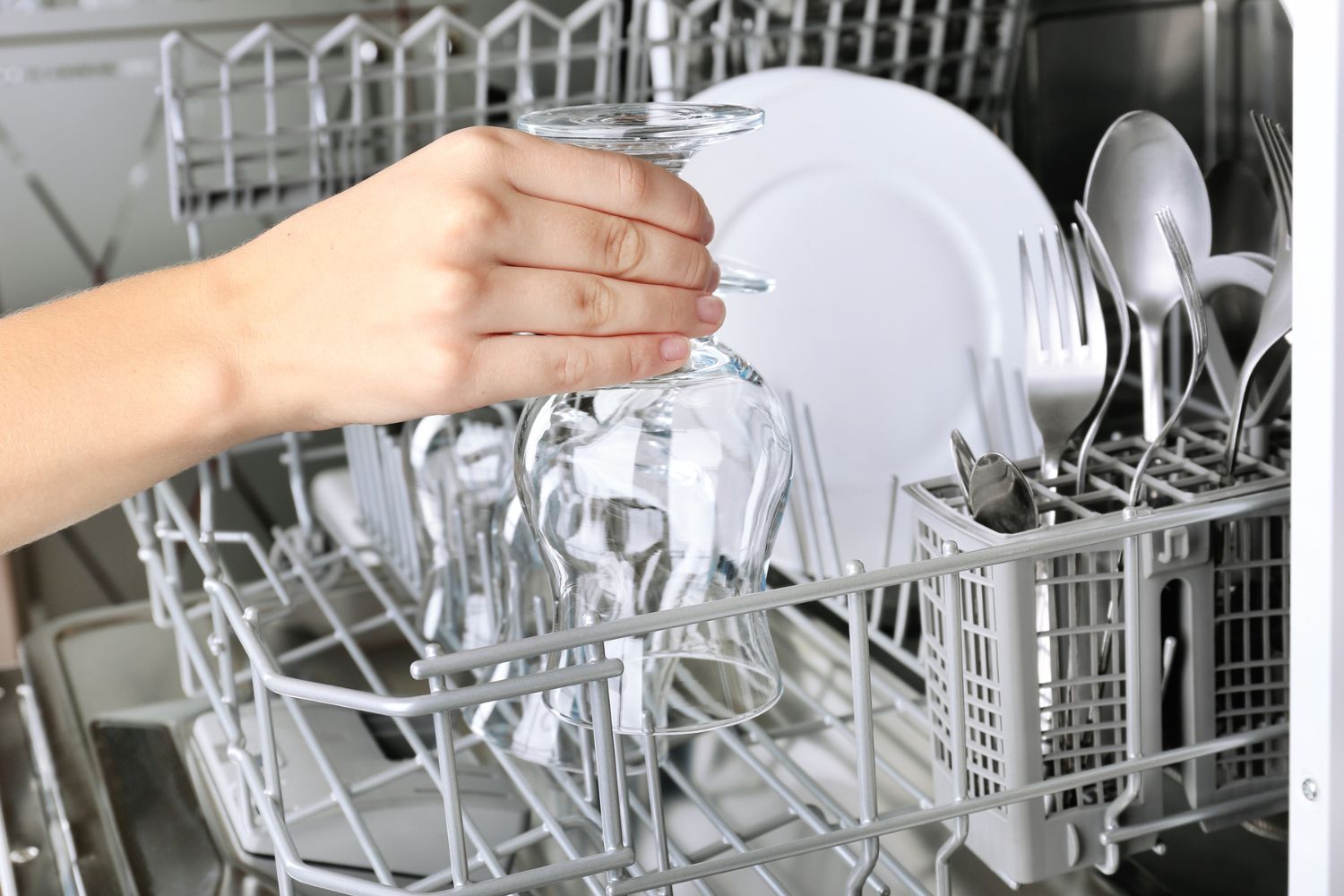

We may earn revenue from the products available on this page and participate in affiliate programs. Learn More ›
Q: We recently bought a home with appliances that are about 8 years old. Our dishwasher recently began making an odd noise, and we are trying to decide whether to repair or replace it if it’s near the end of its lifespan; it’s going to be expensive either way. How long does a dishwasher last?
A: In general, a dishwasher should last between 9 and 16 years. Depending on the age of yours, it may be worth consulting a reliable appliance repair person before planning to replace the appliance. If you do need a new one, you can start fresh and take steps to prolong your dishwasher’s life.
Dishwashers do a lot of dirty work, and over time they pay the price. Constant exposure to water can lead to corrosion, buildup of acidic food scraps and abrasive cleaners can wear on liners, and the fact that most owners don’t know much about dishwasher maintenance can hasten the dishwasher’s demise. But these are just some of the conditions that can affect the lifespan of a dishwasher. There are many others, and some are within your control, so look at how you’re using and caring for your dishwasher.
The average lifespan of a dishwasher is 12 years, with most having a typical lifespan of 9 to 16 years.
How long can a dishwasher last? The average life of a dishwasher is about 12 years. But the average dishwasher lifespan of 9 to 16 years is a pretty wide range.
How can you gauge when yours needs maintenance, repair, or replacement? You may notice that your dishes are coming out of the dishwasher still dirty or with a residue on them. The fix for this can be something as simple as cleaning the filters or adding a rinse aid—those answers can be found in your owner’s manual. Or perhaps you’ve noticed a small leak, in which case it’s possible that the gasket that seals the door has gotten old and dry and needs to be replaced.
Some issues may be easily repaired by a qualified technician, such as clogged lines or heating element problems and electrical shorts, but the costs are usually reasonable expenditures to extend the life of the dishwasher. Larger problems may be more expensive to repair than replacing the whole machine, and a technician can help you figure out when it’s time to make that call.
You’ll want to balance the size of the problem against the age of your dishwasher: If yours is at 15 years and the pump stops working, it’s time for a new machine because it’s near the end of average dishwasher life expectancy, and an expensive repair won’t add much more time—plus the new dishwasher will likely be more energy efficient and reduce your electric bill.

However, the life of a dishwasher depends on a number of factors, including frequency of use.
How often do you use your dishwasher? Like any machine, a dishwasher needs to be run pretty regularly to keep all the parts in functional order, so if you’re hand-washing most days and only occasionally using the dishwasher, you may inadvertently be shortening its productive life. On the other hand, once- or twice-daily uses will wear down the parts more quickly. To extend the average life of dishwasher parts, use your dishwasher at regular intervals but not necessarily every day.
Of course, even with daily use, a high-quality dishwasher will last longer than a less-expensive model that has lower-quality parts. Dishwashers are available at a wide range of price points, and while you don’t need to buy one that has every one of the latest bells and whistles, choosing a high-quality machine with quality craftsmanship from a reliable manufacturer is a worthwhile investment and may save you money on repairs and earlier replacement down the road.
Unless you’re very comfortable working with both plumbing and electrical situations, choosing professional installation can help make sure that all the connections are properly made and reduce the chance that small leaks or poorly connected electronics will overtax the machine and cause an earlier-than-necessary demise.
There are some ways you can make your dishwasher last longer.
Aside from choosing a quality dishwasher in the first place (which may not have been an option if your dishwasher was already in place when you purchased your home), there are steps you can take to prolong your dishwasher’s life. First and foremost, basic maintenance will help a dishwasher work more smoothly for longer. Dishwashers should be cleaned regularly. You may be wondering why, and the answer is simple: Think, for a moment, about everything that’s on the plates and pots and pans you put in the dishwasher. While the water and soap scours the debris off the dishes, it all has to go somewhere. Some of it is sprayed against the interior walls of the dishwasher, where it can build up behind the door gasket and cause it to seal improperly or wear away. Other bits are cast into the filters or are forced through the filters to lodge in low spots in the drain hoses. These buildups can cause foul odors and can force the pump on the dishwasher to work harder and wear out faster. Cleaning the filters and interior is a simple task that requires no special knowledge—just a careful reading of the owner’s manual. In addition, you can reduce the amount of buildup by scraping the dishes thoroughly before loading (not prerinsing, just scraping well) and loading the machine as recommended by the manufacturer. Adjusting your water heater so that the water is very hot will also help break down particles before they have a chance to stick. Air-drying the dishes can also reduce wear and tear, as the high heat from the element can cause materials to break down faster.
Beyond these steps, it is important to consult an expert for repairs that you can’t or shouldn’t handle yourself. Putting off calling a technician can allow a small problem to develop into a large one.

There are a number of dishwasher issues that may require the attention of an appliance repair technician.
Many contemporary dishwashers have a range of integrated electronics to control cycles, temperatures, and power, and some are even Bluetooth-enabled. In general, if making a repair involves opening anything other than a filter cover or a wash arm to physically clean, an appliance repair technician should handle it. Sensitive wiring and control switches can easily be dislodged or damaged by improperly opening compartments that are not intended for access by an untrained person, even if that person is handy or has watched a helpful YouTube video.
What if your dishwasher won’t start at all? The answer could be as simple as a broken door latch or as complex as a shorted-out motherboard. If you know a lot about diagnostics and electronics, you may be able to correct the problem, but if not you stand to waste a lot of money and time trying. In some cases, it makes sense to try basic maintenance or repair yourself, calling a technician only if that fails. If your dishwasher isn’t draining properly and you’ve cleaned the filter (and run your garbage disposal, which can help clear blockage), you’ll want to call a repair person to check the pump and internal drain hoses. Similarly, if the dishwasher starts making unusual noises, you can first check to see if one of the arms has come loose and is bumping into dishes or walls, but after that you’ll need a technician to explore other possible causes. If several systems have broken down, a technician can help you understand if it makes more sense to repair the dishwasher or replace it.
Fixing dishwasher issues or otherwise replacing a dishwasher can be costly; a home warranty with dishwasher coverage can come in handy.
Most people will try hard to address issues themselves before calling in a repair person (using the aforementioned YouTube videos or general know-how), because hiring a repair person can be expensive right from the beginning. Most repair people charge a flat fee for walking in the door, then charge per hour for labor in addition to charges for parts. If the repair person doesn’t happen to have the necessary parts on hand, one visit can turn into two or three visits. This often dissuades people from calling for repairs and can result in replacement costs when a simple repair might have been less expensive. Or homeowners will simply put off small repairs to avoid the expense until there is suddenly a colossal and irreparable problem. Especially if your dishwasher and other appliances are older, a home warranty from one of the best home warranty companies can help extend the life of the appliances by making maintenance visits and immediate repairs more affordable.
A home warranty involves paying an annual premium to cover whole-house systems, kitchen and laundry appliances, or a combination of the two, depending on the policy you choose. Once you’ve paid that premium, you’ll be charged a flat, predetermined service fee for each claim you make, usually between $55 and $150. The technician will perform the necessary repairs for this fee, or recommend when to replace dishwasher components or the whole machine, which is also covered by this fee and your premium. There are of course some policy limitations, all of which will be spelled out clearly in your policy. With service calls for a dishwasher repair averaging between $160 and $300, a home warranty can come close to paying for itself with a single call, especially if the appliance is at the end of the life expectancy of a dishwasher and needs to be replaced. The greatest benefit of a home warranty is that you can call for service with the confidence that you know how much you’ll have to pay; the budget for the call is set, not the open-ended tally of a service call without a warranty in place. This means you can call for service sooner rather than putting it off in case it’s too expensive and letting the problem build.
Dishwashers are part of many households’ daily routine, so choosing a quality dishwasher, taking good care of it through cleaning and regular maintenance, and seeking prompt professional repair service will prevent costly failures and help your dishwasher maximize the average life of dishwasher performance well beyond the average 12 years. So if your question isn’t “how long should dishwashers last” but rather “how long can dishwashers last,” the real answer is that it depends on quality, use, and maintenance.
